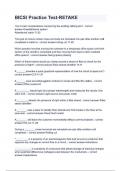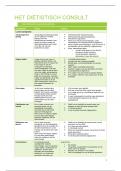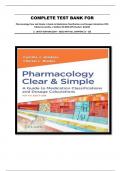BPP University - Legal Practice Course – Own Summary Notes (Sept 2019 – Jun 2020)
Wills and Administration of Estates (Oct 2019)
Contents
Subject Page
Distribution of a person’s property on death
The Succession/Distribution Estate 3
Rules of Intestacy 4
Intestacy flow chart 5
Intestacy flow chart additional notes 6
Example Will 7
Example Will continued and Incorporated Document 8
Validity of a Will 9
Validity of a Will continued and Incorporated Documents 10
Alterations to a Will 11
Powers of executors and other final clauses 12
Codicils 13
Revocation of a will 14
Effects of Divorce 15
Inheritance tax
Chargeable transfers 16
Valuing chargeable transfers 17
Identifying the death/taxable estate 18
Cumulative total and nil rate bands 19
Exemptions/Reliefs available for lifetime transfers ONLY (failed PET and LCT) 20
Exemptions/Reliefs available for lifetime transfers ONLY (failed PET and LCT) continued 21
Exemptions/Reliefs available for lifetime transfers (failed PET and LCT)
AND the death estate 22
Exemptions/Reliefs available for the death estate only 23
Liability for IHT 24
© Timothy John Tyne Page 1 of 49
,Legal Practice Course Wills and Administration of Estates (Oct 2019)
Applications for reliefs to lifetime transfers (failed PETs and LCTs) 25
Applications for reliefs to lifetime transfers (failed PETs and LCTs) continued 26
Taxation of the death estates 27
Administration – Application for a grant of representation
Personal Representatives duties and initial steps 28
Grant of Representation – Executors 29
Grant of Representation – Administrators 30
Application for the Grant of Representation 31
Excepted Estates 32
Details of the IHT 205 and IHT 400 Forms 33
Administration of an estate – post grant practice
Duties of Personal Representatives (PRs) 34
Breach of duties by PRs and remedies for breach 35
Safeguards protecting the PRs from liability 36
Statutory Powers of Personal Representatives 1 of 3 37
Statutory Powers of Personal Representatives 2 of 3 38
Statutory Powers of Personal Representatives 3 of 3 39
Further duties to beneficiaries relating to statutory powers 40
Non-Statutory Powers of Personal Representatives 41
Steps following Grant of Representation 1 of 3 42
Steps following Grant of Representation 2 of 3 43
Steps following Grant of Representation 3 of 3 44
Changes in Wills and Administration of Estates law since 2019 45
Appendix: Internet links to various forms/documents 46
List of cases in chronological order with page it first appears 47
List of legislation in chronological order with page it first appears 48
Bibliography and References 49
© Timothy John Tyne Page 2 of 49
,Legal Practice Course Wills and Administration of Estates (Oct 2019)
Distribution of a person’s property on death
The Succession/Distribution Estate
The succession/distribution estate
This includes all the deceased’s assets except the following which may be excluded.
It is distributed to the beneficiaries according to the will (or intestacy rules if there is no will).
Excluded assets
1 Property held as a JOINT tenant – passes to the remaining joint tenants on death by the law of
survivorship. (Property held as a tenant in COMMON forms part of the succession estate.)
2 Insurance policies written in trust - e.g. life assurance policies. These pass to the named
beneficiaries in the policy on presentation of a death certificate.
3 Discretionary pension schemes/lump sum pension benefits – these are lump sums paid on the
pension holder’s death. The beneficiary must be named in an “Expression of Wish” form otherwise
the lump sum passes to the succession estate.
4 Statutory nominations – made in writing to transfer sums in certain friendly building societies
accounts. The nominated person receives the sum which is not subject to the will or intestacy rules.
It is rare and sums are limited to £5,000.
5 Donatio Mortis Causa (DMC) – is a gift made in contemplation of and conditional upon death of
the donor giving the gift (during their lifetime). The gift does not form part of the succession estate
but can be recovered should the donor change their mind before death.
6 Trusts/Settlements – Assets held in trust from which the deceased benefitted are governed by the
deed that the trust and so do not normally form part of the deceased’s distribution estate.
An example of such a trust is a life interest trust where the life tenant receives the income from the
trust fund but on their death the fund goes to the remainderman who has a reversionary interest
and not to the life tenant’s distribution estate.
Note The succession (distribution) estate is different to the death (taxable) estate.
The death estate is used in the calculation of inheritance tax.
© Timothy John Tyne Page 3 of 49
, Legal Practice Course Wills and Administration of Estates (Oct 2019)
The Rules of Intestacy
Legislation Most of the rules of intestacy are contained in
The Administration of Estates Act (1925) – AEA 1925
The Inheritance and Trustees’ Powers Act (2014) – ITPA 2014
Forms of Intestacy
Wholly intestate A person who dies without a (valid) will, will have the whole of their estate
distributed in accordance with the intestacy rules.
Partially intestate A person may have a valid will but fail to state how part of it (such as the
remainder) is distributed. This would be distributed according to the intestacy rules. This can
be avoided by stating in the will how the remainder is distributed.
Two main beneficiaries of an intestate
These are the surviving spouse/civil partner and issue.
Spouse/Civil Partner relationships that are recognised were extended to same sex couples under
The Civil Partnership Act 2004 Civil Partnerships of heterosexual and same sex couples
The Marriage (Same Sex Couples) Act 2013 Marriages of heterosexual and same sex couples
o This act also redefined marriage to include same sex marriage in all legal documents
made on or after the 13th of March 2014. This can also affect a will that may stipulate
a person must be married in order to inherit since after 13 th March 2014 the
marriage could be a same sex marriage.
Issue are children and remoter lineal descendants and include
legitimate (born to married parents)
illegitimate (born to unmarried parents)
legitimised (born to unmarried parents who later marry)
adopted children
© Timothy John Tyne Page 4 of 49










